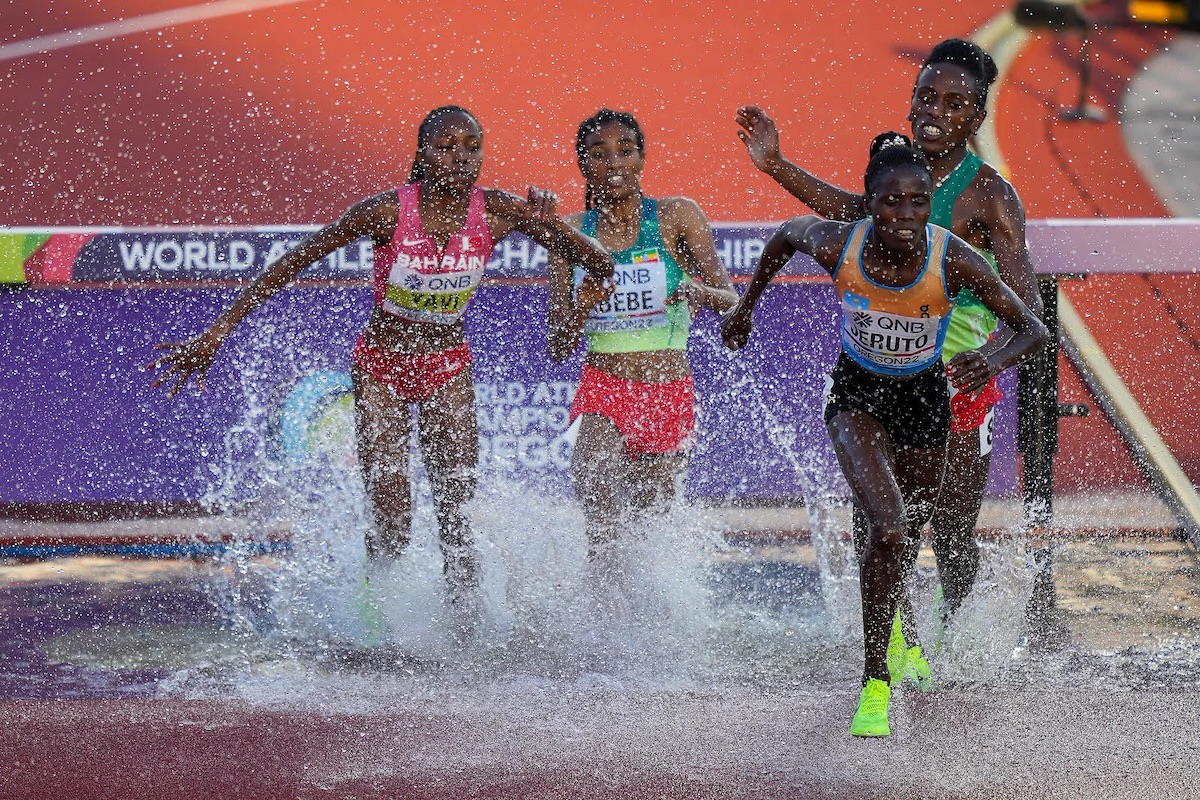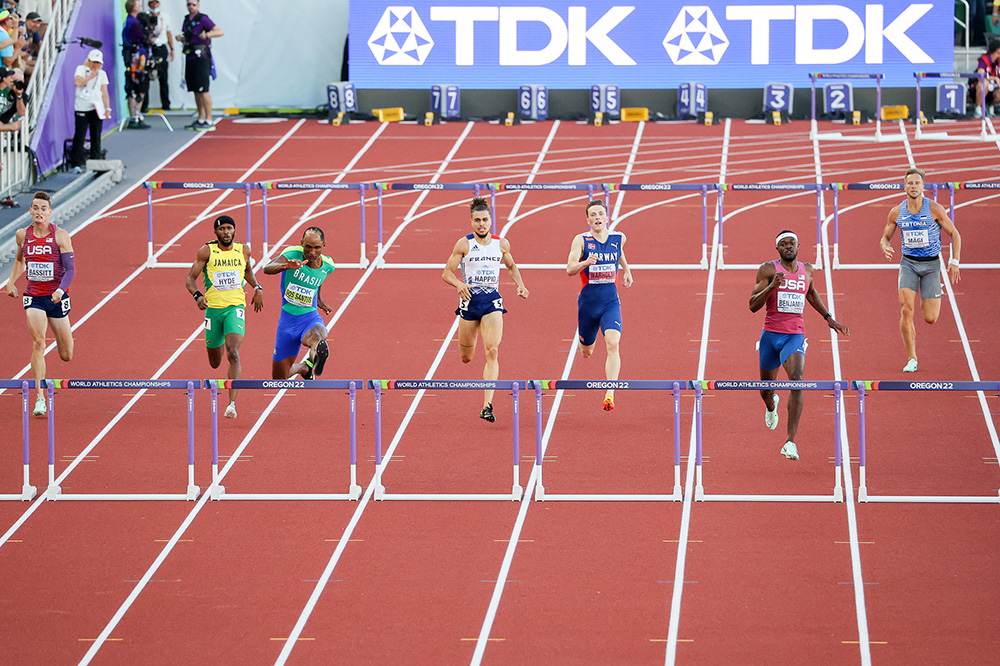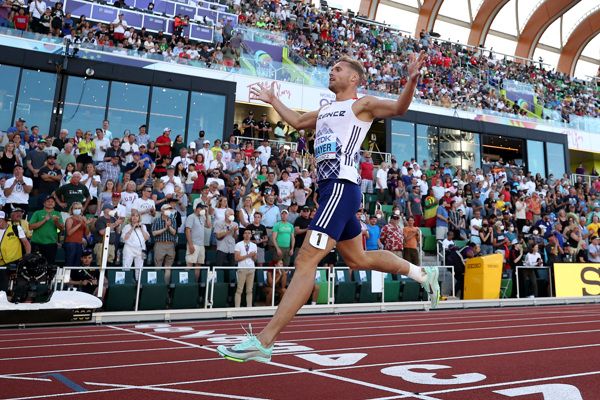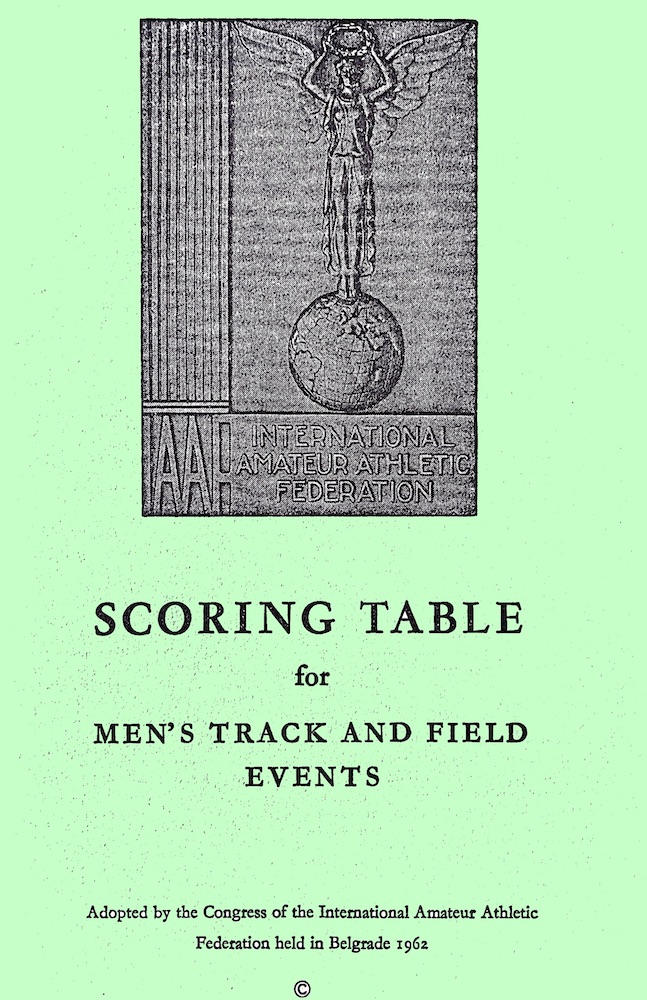After Tokyo I have started wondering whether D. Brazier, heralded as the new talent of 800 m, was just a shooting star, bright once and then gone. In any case his performance in Eugene is supporting my suspicions. Brazier was eliminated in the heats, together with Hoppel and Dobek (and I must say that I was somewhat disappointed by the elimination of the latter). The semis saw another series of eliminations: Robert, Kramer and Garcia (the last one a real surprise). So the final was going to be a rather tame event but it was made interesting by the finish surge of Sedjati who secured the second place with 1:44.14 just behind Korir (1:43.71) pushing Arop to third and Wanyoni out of the medals. Tual looked in contention for a medal up to the final 20 metres but could not sustain the final sprint and ended at sixth place.
The women's 800 m was a bis repetita of the Tokyo final with Mu and Hodgkinson the protagonists. They finished in the same order Mu 1:56.30, Hodgkinson 1:56.38. Still I have the impression that Mu's victory was more difficult than the one of last year. And Mu was obliged this time to sacrifice the relay medal since the 800 m final was taking place just one hour before the relay. The heats saw the elimination of Almanza. She was followed by Reekie, Lamote and reigning champion Nakaayi in the semis. And of course just as in Tokyo there were no DSD runners polluting the event. (I am looking at you Semenya, Niyonsaba and Wambui).
After his Olympic triumph J. Ingebrigtsen was the favourite of the 1500 m. However it turned out that the race was really fast and when it came to the final sprint he was surprised by J. Wightman and conceded the victory 3:29.23 to 3:29.47. M. Katir was third in 3:29.90 in a race that saw Cheruiyot and Kipsang relegated to the seventh and eighth places respectively.
Kipyegon confirmed her supremacy over the 1500 m beating roundly Tsegay and Muir. Their times were 3:52.93, 3:54.52 and 3:55.28. I was particularly pleased with the fifth place of S. Ennaoui. She is back after two years of absence and her final sprint is always impressive. There was a small drama in the semis with Sabbatini pushing Nanyondo who fell and could not finish. Sabbatini was subsequently disqualified and Nanyondo was admitted in the final where she finished eighth.
Ingebrigtsen took his vengeance in the 5000 m, a tactical race where he did not have any trouble to prevail in the sprint 13:09.24 over J. Krop 13:09.98 and O. Chelimo 13:10.20. Cheptegei did participate in the race but he gave the impression that he was not really interested, finishing ninth. Still he was ahead of Barega who could do no better than twelfth. A remarkable presence was that of guatemalan L. Grijalva who finished fourth missing a medal for just 44/100.
The women's 5000 m was also a tactical race. As such it should have been ideal for S. Hassan. However Hassan of 2022 has no relation to the one of 2019 and 2021. So, while she was in contention for a medal up to 4900 m she faded to sixth over the final sprint, Tsegay winning the race in 14:46.29. Fortunately Niyonsaba could not participate in the championships due to injury. Had she been present and won a medal I would have had a great difficulty containing my anger. On the other hand Semenya did take part and was roundly beaten, exiting at the heats with 15:46.12. Stuart Weir at Runblogrun commented: "Sad more than bad". I confess that I have trouble understanding the game Semenya is playing. Is she trying to convince us that she just likes running and she is doing it in a financially uninterested way? I, for one, am not convinced.
Cheptegei would not be trapped as in the Olympics. He had a total control of the 10000 m race and he won in 27:27.43 ahead of Mburu and Kiplimo. Barega and Aregawi could not get past Cheptegei this time and had to content themselves with fifth and seventh place. Women's 10000 m was won by Gidey in 30:09.94. Hassan took part in the 10000 m but could not finish better than fourth, being beaten in what was her strength, the final sprint. It is remarkable that both Cheptegei and Gidey were more than one minute off their respective world records.
In the absence of Kipchoge and Jepchrichir I found the two marathons less attractive. Tola, who was second in 2017, won the men's race in 2:05.36 while Abdi was third just as in Tokyo. I was somewhat surprised by the decision of Nageeye, second in Tokyo, to drop off the race after 41 kilometres. He justified this by saying that he was vying for a medal and stoped when he realised that he was not going to get one. He later said that he regretted that decision of his since he will always be accompanied by DNF in the results. Gevreslase won the women's race in 2:18.11 while Salpeter obtained the bronze medal, which will help her forget her Tokyo misfortune.
El Bakkali won the men's 3000 steeple in 8:25.13, a tactical race that presented no interest whatsoever. Girma was second just as he did in Doha and Tokyo. Olympic and World champion C. Kipruto who had been away from competition in 2020 and 2021 was back on the podium winning the bronze medal. The women's race was dominated by Jeruto in 8:53.02. Yavi was following Jeruto throughout the race and could hope to obtain silver. Unfortunately for her, a stumble after the last river jump allowed the two ethiopians to pass her and she ended up fourth just like in Doha. Unfortunately, the World Record holder and reigning champion B. Chepkoech withdrew from the championships due to an injury and has not been racing the last two months.
Felix finally got her 20th gold. At the last moment, in fact after she had left Eugene, she was called back in order to participate in the 4x400 m semis. Thus she was eligible for a medal, provided the team obtained one in the final. Well, they did but this year they could not have the dream team of Tokyo. Mu was running her 800 m final in the same session as the relay and Muhammad felt a discomfort in her hamstring and preferred not to run the relay. Thus the composition was T. Digges (the 2022 US champion), A. Steiner, B. Wilson (the new low-hurdles talent) and S. McLaughlin. They had practically won the race after the first three laps with splits 50.50, 49.99 and 49.39 s. And then McLaughlin ran a 47.91 s anchor giving the US a 3 seconds advance over the second team, Jamaica. The speculation was over: McLaughlin has a value around 48.30-48.40 which puts her at the same level as S. Miller-Uibo. It would be interesting to have the two competing over a 400 m flat but I don't think they will do it.
The team of Netherland was disqualified in the semis having dropped and retrieved the baton. I had to look up the rules in order to understand what happened, and believe me, they are complicated.
The men's relay was easily won by the US team in 2:56.17. But the interesting race was behind. D. Borlée passed the baton in second place and, after the relay of J. Watrin, Belgium was in fourth place. They moved to third thanks to A. Doom and the great anchor of K. Borlée did not let the bronze escape. And, in fact Jamaica kept the silver only thanks to a fantastic anchor by C. Taylor. It would be interesting one day to count the medals of the Belgian 4x400 m team. And it's a country with a population of just over 10 million.
Those of you who are expecting a report on race walking are in for a disappointment. As I explained on several occasions, I consider that race-walking is pure cheating (in the sense that everybody is running, not walking) and I ignore it in my report (even when, as in Eugene, a greek girl finishes fourth in the 35 km race).






























